In light of recent forum threads discussing and in some cases questioning the skill and expertise in angling I do wonder what lies ahead as technology gradually takes over from skill.
I suppose I’ve got more fishing years to look back on than most, which makes it easier to see the changes that have taken place over those years (no, don’t run away, this isn’t going to be one of those articles from an old fart bemoaning a misspent youth and yearning for yesteryear). Most of those changes have been excellent for anglers, making fishing a much more comfortable and, in some respects, enjoyable sport.
I can’t help but wonder though, just where the skill has gone. At those times when I sit there waiting for a bite, looking at the tackle surrounding me and recalling what we had available 40 years and more ago, one part of me acknowledges how lucky we are and another part of me wonders just where it will all end as the advance of technology and knowledge slowly wrings the neck of fishing as that simple, instinctive hunting sport it once was.
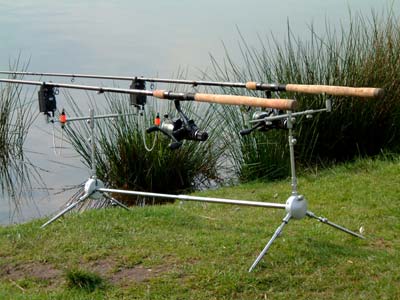 |
| So what’s the target species with this set-up: carp, tench, bream, roach, perch…..? |
With the aid of newspapers, magazines, radio, TV, DVDs and the internet, the world is a much, much smaller place than it used to be and budding anglers can soak up years of experience in a very short time indeed.
Optimum methods and baits are now a reality and any angling newcomer with only a modicum of hunting instinct can acquire the knowledge, the venue, the tackle and the bait and become instantly successful. Or at least successful as far as what ends up in his landing net is concerned, but as many of us more experienced anglers realise, what you catch is only one measure amongst many of the elements that measure angling success.
Lady Luck will always have her say
In spite of high tech tackle and baits and ‘the knowledge’ being readily obtainable, fishing has always had, and always will have, an element of luck about it. That’s the nature of fishing, a subjective rather than objective sport and, let’s admit it, part of its attraction is that it is immeasurable. The influence of Lady Luck means that no matter how hopeless the prospects may seem on a bleak winter’s day, there is always a chance of catching something.
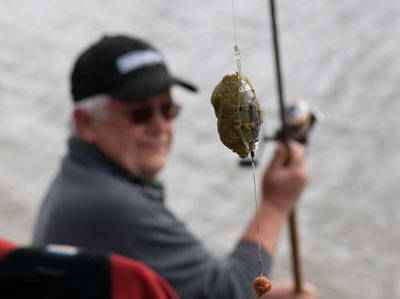 |
| The Method Feeder and a hair-rigged boilie, but what am I fishing for? |
Of course, it works the other way round too, when we are brimming with confidence and then record a blank. But I wouldn’t have it any other way. It’s not knowing what’s going to happen, the unpredictability of it all, that makes us pick up the rods on those days when logic says we’re wasting our time.
But, and this is a big ‘but’, is the mistress of fortune having too much influence these days? Have we traded fishing skills for more of her charms, to the point where watercraft, species knowledge and tackle handling has slid down the scale of angling expertise requirements and luck has slid upwards? Have we reached the point where, once you have acquired the tackle, bait and ‘the knowledge’, fishing is just a mere lottery? Is fish-catching now reduced to the latter as you sit there fishing with the standard (optimum) method and bait?
So what is this standard method and bait?
It’s been obvious for some time now that there is a standard approach to catching big fish, but the message was rammed home to me during a visit to the Ribble not so long ago. I met up with a pal to fish for chub and I took my usual chub fishing gear and bait, which was an Avon type rod, 6lb line, 5lb hook link, and link leger end rig with a 6 hook. Bait was a choice between bread and cheese which was fished direct on the hook.
Later in the session I took a walk along the 300yds or so of riverbank to see how my mate was doing and found him fishing two heavy(ish) rods kitted out with 10lb line, fixed leads, coated braid hook links to 6’s hooks with hair rigs that each held a boilie. He was feeding pellets via a PVA bag.
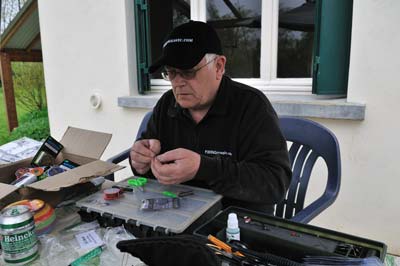 |
| Making a few different rigs, but they’ll all be based on the hair rig and probably the bolt rig |
“I thought we were fishing for chub today.” I said.
“I am,” he replied, “they love these pellets and boilies. Had loads of big chub on this gear and bait while fishing for barbel along here through the summer months.”
“So you’re not really fishing for chub then,” I said, “you’re fishing for whatever picks your bait up and just hoping for chub.”
“Yeah, I suppose so.” He answered. “But fishing like this I’ve got a chance of barbel as well.”
Other than very subtle variations that’s also how most specialists fish for bream, tench, carp and, to some extent, roach and crucian carp, as well as barbel and chub.
Before I launch into this discussion any further let me acknowledge that I’m not out of this loop. I’m not pontificating here from an aloof position, looking down at everyone else because I behave differently. Oh no, I’m with the rest of you, no different at all, using all the modern methods at my disposal. I’m merely highlighting a situation that grows worse(?) as we increase our knowledge of fish behaviour and further develop tackle and baits that increasingly replace individual skills.
The main thing that concerns me is that we are fast heading towards a standard method and bait that has the optimum chance of catching all sizeable bottom-feeding species. Heading towards? No, we’re already there as far as method is concerned, for the bolt rig/hair rig combination is the standard approach used to catch all coarse fish except predators (and even those to some extent). Of course there are variations of the bolt rig/hair rig, but that’s all they are, mere variations of a very common theme whose overriding purpose in life is to encourage fish to hook themselves.
No more watching sensitive indicators and timing the strike to perfection these days is there?
Bait is fast heading that way. Boilies and pellets are being used for almost everything, almost exclusively. But not quite. Paste is hanging in there, yet even paste is boilies in another guise, before the rolling and boiling stage and given the fancy title of ‘designer paste’ to make it sound more exotic than it really is. Particles are still having a say in things, but how long before bait development reaches the stage where paste and particles are no longer needed? Soft hooker pellets are already with us and they’re just shaped pieces of paste whichever way you look at it. It doesn’t make sense to say it will never happen; it may take longer for the optimum bait to take over than it took for the optimum method to do the same, but judging by the way things are going, it will. Perhaps to not quite the same extent, but bait will continue to be developed until the choice is narrowed down to a few varieties of the optimum bait which will probably end up in some kind of pellet or boilie form.
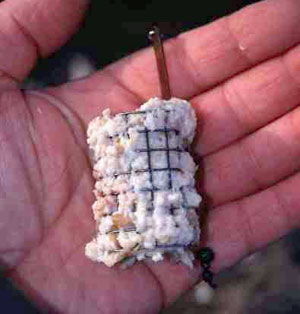 |
| Soon to be a thing of the past for chub? |
Or is it already there?
Match fishing has gone the same way
Quite apart from the fact that match fishing is nowhere near as popular as it once was, it too has become much more of a lottery than the mere luck of the draw. Convenience in the shape of commercial carp pools, high tech poles and, again, bait knowledge, have seen to that.
Gone are the days when a hundred or more match anglers lined the banks of rivers like the Trent and battled it out with a variety of methods that ranged from legering with bomb and feeder to float fishing with a pole, waggler, or trotted stick float. No longer do match anglers make their own floats and breed their own gozzers to give them an edge over those who couldn’t be bothered. No, everything can be bought these days, and good stuff it is too, leaving little room for the enterprising matchman to give himself that vital edge.
Today, most matchmen are lining the banks of commercial carp fisheries, each armed with an increasingly longer and lighter pole fitted with an elastic that will wear out the heaviest carp or catch the smaller ones ever faster, fishing pellets out of a packet and feeding ‘designer’ groundbait bought from the tackle shop. The winner will be decided by the fittest as much as the fastest as each angler competes to haul in more conveyor belt carp than anyone else.
So what’s the answer?
There isn’t one, or at least there is no answer that will suit everybody. Those who are quite happy to fish with an optimum (standard) method and bait will continue to do so. And why not, providing they’re happy with that? And if they want to convince themselves that anything they catch will be due to exercising great watercraft and skill to target a specific species then who am I to argue?
The answer for anyone who wants an answer lies in their own hands. In my case I still fish for chub with stick float, waggler, link-leger, feeder and use maggots, casters, hemp, bread and cheese.
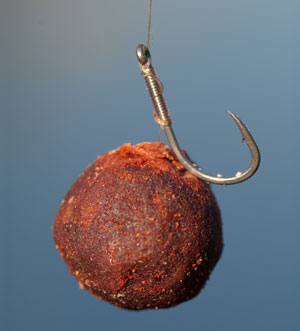 |
|
It’s either a boilie or a pellet for most species |
And any other tackle and bait that either takes my fancy or I reckon will give me the best chance on the day, including a bolt rig and boilie if that’s what I want to do. Most often when fishing for bigger chub I choose to fish with a link leger, or cage feeder and bread and/or cheese paste hook bait. I choose that most often, not because it gives me the best chance of catching the biggest fish, because the truth is that it doesn’t on rivers like the Ribble, but simply because that is the method and bait that gives me the greatest enjoyment and the greatest sense of achievement, for with anything else I feel like I’ve compromised, that I’m fishing for bites rather than specific species. Apart from float fishing for them that is, but that opportunity doesn’t present itself as often as I would like.
But I do wonder what fishing will be like in another 40 years or so, when tackle and baits have been developed to an even greater degree and fishing becomes an even bigger lottery than it is now.
The truth is that angling practices do change and standards change along with them as fishing becomes increasingly easier. Today, the capture of the biggest specimens ever more relies on keeping an ear to the grapevine than it does on skill, and match fishing success is now as much to do with speed, agility and stamina as it is know-how. That isn’t to say there are no top anglers in either persuasion, but that it is now more difficult to single any out. It’s a real truth that there will never be another Richard Walker or Ivan Marks. There will never be another angling ‘legend’, even though the angling press try to bestow that label on many undeserving well known anglers.
It’s up to the individual of course, where specialist angling is concerned, to fish how he prefers. He, like me, can choose to use a less efficient method when it’s case of putting enjoyment and satisfaction before results (which I don’t always do). But anyone with any designs on the Drennan Cup, or awards like it, will have to stick to the ‘standard method and bait’. And match anglers are stuck with the method that hauls fish in at the fastest possible speed, whether they like it or not, if they’re going to stand a chance of winning.
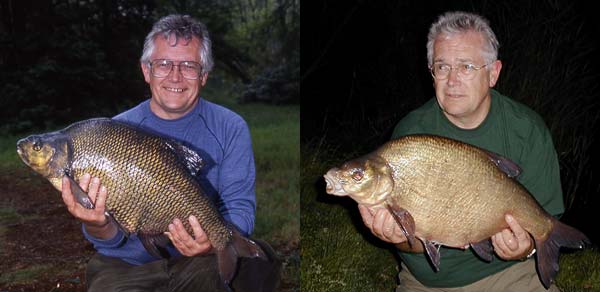 |
| Left: Caught from a Cheshire mere on worm tipped with caster on a light paternoster rig Right: Caught from a gravel pit on boilie and method feeder |
You just have to hope that sometimes the most efficient method is the most enjoyable method for you as an individual, and then you’ve got the best of both worlds. My belief is that angling is going to change to much more of a lottery than it is now.
So, as most of us sit there fishing with the same optimum method and bait for almost every species of coarse fish except predators, what do you think?













